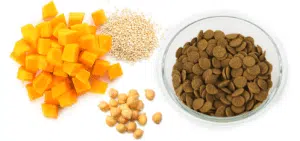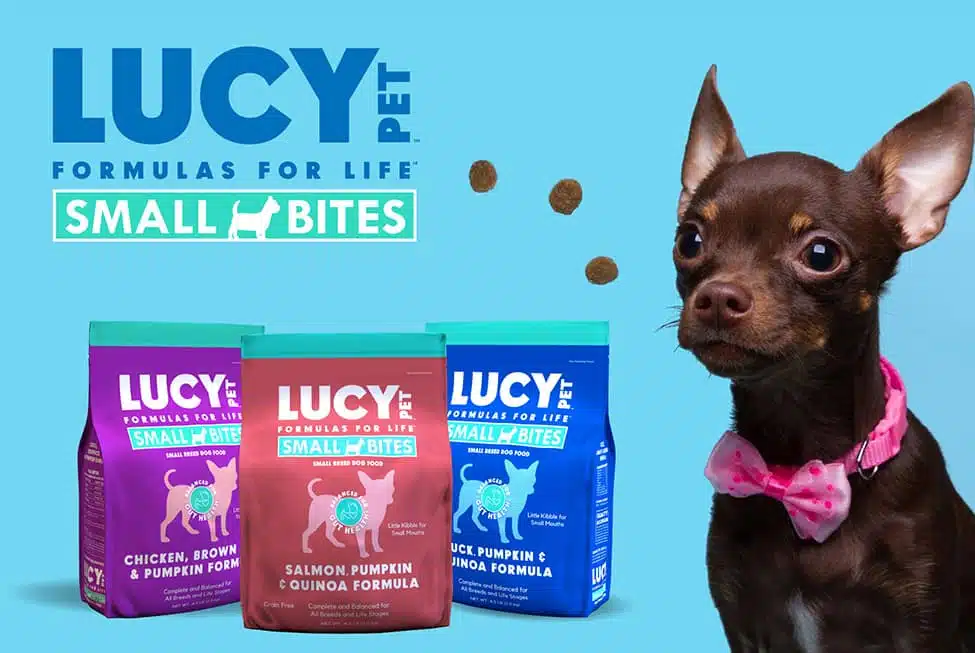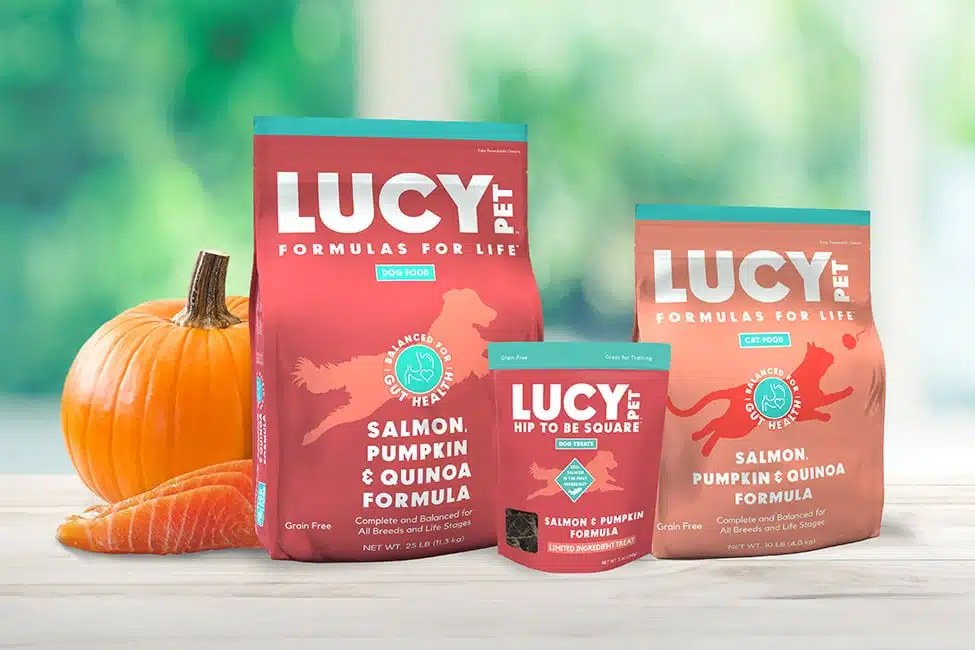Carbohydrates and Grain-free Pet Foods
 Are carbs good or bad? Why are there carbs in pet food? Are the carbs in grain-free food healthy? Do the carbs in grain-free foods cause obesity or diabetes? Can the carbs in grain-free diets cause heart disease? In this article, we will address these questions and more.
Are carbs good or bad? Why are there carbs in pet food? Are the carbs in grain-free food healthy? Do the carbs in grain-free foods cause obesity or diabetes? Can the carbs in grain-free diets cause heart disease? In this article, we will address these questions and more.
Understanding Carbohydrates in Pet Food
There is a great deal of misleading information which can misrepresent the role and value of carbohydrates in nutrition. Here are a few key facts about carbohydrates:
- Carbohydrates provide energy, which is essential to survive.
- Cats and dogs are very efficient at digesting and converting carbs into energy.
- It is much more difficult to obtain energy solely from meat/fish protein, it takes longer and is more taxing to the body, so a diet with zero carbs actually creates more physical challenges to the metabolism and may even cause digestive issues. What is key, however, is the type of carbs used in a diet, and how they are blended with protein, fats, and fibers.
- As a point of differentiation, there are “simple carbohydrates” and “complex carbohydrates” which digest differently and convert to energy differently.
Pet Food Label Truths
It is important to remember that no single ingredient is the most important in pet food. Some people will hyper-focus on the first ingredient or just the first 4-5 ingredients. While these do represent the highest percentage of the formula by weight, a dog or cat would not survive or be healthy on just those first 5 ingredients. In fact, it is the combination of all ingredients when digested which contribute to the total nutrient profile and quality of food. It is very important to also understand that meat/fish protein alone does not provide all of the necessary nutrients for dogs and cats. Remember that ingredients are designed to work in combination, so your pet gets nutritional value throughout the digestion and absorption process.
Carbohydrates are important because they provide glucose (energy) for the brain and central nervous system. Carbohydrates can vary in quality and nutrient contribution, depending on the brand. They can play an important role in cat and dog diet’s such as providing energy, protein, and fiber. The majority of carbohydrates that Lucy Pet uses are generally complex carbohydrates, which convert into energy more gradually. Science has proven conclusively that dogs and cats have a very efficient body to digest and process carbohydrates properly. Complex carbohydrates also provide longer-term storage of energy long after the animal has finished eating. When pets eat, carbohydrates, proteins, and fats are all digested and broken into smaller parts. Once broken down, these will affect blood glucose differently depending on how they are absorbed and how the body uses them. It doesn’t matter if the diet is grain-free or with grains, carbohydrates are important for energy and brain function.
Today, when you are browsing the web or store shelves selling dog food, you’ll see that grain-free formulas are popular in the pet food industry. This is largely a popular trend mirroring human food trends, but both grain-free diets and diets with grain can be excellent options.
What is in a Pet Food Formula? Protein, Fat, Fiber, Carbohydrates, Vitamins & Minerals
The kibble is a marvel of modern science. Every single kibble has all the nutrients your pet needs to live and be healthy. In fact, there are over 40 essential nutrients that dogs and cats require to stay alive and thrive. Nutrition is complex because of how the body digests and processes what is consumed. Some nutrients digest slowly, others more quickly. Nutritionists create a recipe to using a variety of ingredients to provide proper ratios of protein, fat, fiber, and carbohydrates as well as vitamins and minerals. Part of the reason for using a variety is because some ingredients can be a source for essential amino acids to build muscle, or for healthy organ function. Complex carbohydrates digest slowly and provide sustained energy that is critical for brain and body function.
It is important to understand that some carbohydrates may contribute protein, fiber, and also essential amino acids, in addition to an energy source. When pets eat kibble, the proteins, carbohydrates, fats, fibers and vitamins/minerals are digested and broken into smaller parts. Once broken down, these nutrients will absorb into the bloodstream and generate glucose differently, depending on how they are absorbed and how the body uses them.
Since the body requires glucose to provide energy to the body, almost all the carbohydrates within the kibble will be converted into glucose in the body. Complex carbohydrates will digest more slowly and provide a longer energy benefit to the body. The only carbohydrates not changed to glucose are those that cannot be digested, such as fiber. Protein and fat are not directly converted to glucose when digested, but over time, even these will be converted into glucose, although they are not immediately available to the body as energy when consumed. This is why complex carbohydrates are so important to be consumed as part of the overall recipe.
DCM, Heart Health and Grain Free Diets
Recent articles online have raised concern about some dogs that developed Dilated cardiomyopathy (DCM) which is a disease of the heart muscle. Typically, it is a genetic condition in certain large breed dogs, there have been discussions as to whether or not there is a relationship between dogs who develop DCM and the foods they were eating. There have been assumptions made that some grain-free diets were the cause of the DCM issue, however, to date, there is absolutely no data to support this. However, we realize that consumers want to read more and learn about what is best for their pet. The most important advice we can offer is if you have a large breed dog prone to heart disease, visit your veterinarian to have them examined. Second, we recommend feeding a food that is supplemented with proper levels of taurine and L-carnitine to support heart health. Finally, ensure your dog maintains a healthy weight and has regular exercise. But what about the connection to grain-free diets?
All Lucy Pet formulas have always been supplemented with additional levels of taurine and L-carnitine. None of Lucy Pet’s balanced diets have been involved in the reports on heart health issues (DCM). Our formulas are developed by top industry nutritionists with many years of experience who understand how ingredients and nutrients interact when cooked and digested. Our formulas are developed by Dr. George C. Fahey from the University of Illinois and are precisely balanced to ensure our ingredients have the proper ratios for a cat or dog’s health and well-being.
Our president and founder, Joey Herrick led the pet food industry 30 years ago at his previous pet food company when he was the first person in commercial pet food brands to add taurine to dog food. This decision was because when some dogs become stressed, they need additional taurine for their health. So, Joey has always added taurine to our dog food diets long before any other company had even thought about it. Today at Lucy Pet, we have always added both taurine and L-Carnitine for health. In fact, we recently increased our taurine levels even higher.
In a recent article by Lisa Freeman, DVM, Ph.D., DACVM at Tufts University on this topic she states: “Please note that the FDA’s headline did not say anything about “grain-free diets” causing heart problems – though almost all the blog posts and articles in other publications have been saying exactly that. If you read the FDA’s statement, you will see that they said there may be a link between some grain-free diets and canine DCM, but there are also many other things going on that may be responsible for an observed rise in cases of canine DCM”. http://vetnutrition.tufts.edu/2018/11/dcm-update/
Do carbs cause obesity?
It is critical for pet parents to understand that obesity is not caused by consuming carbohydrates. Obesity is caused by poor feeding practices of dog and cat pet parents who do not follow the feeding directions of the pet food manufacturer. The kibble is perfectly balanced to provide complete nutrition in every bite. The key is to feed the recommended amount per day for your pet, depending on their age, weight, and lifestyle.
Health conditions such as inflammation, diabetes, and metabolic issues are caused by many factors, some of the dietary origin and some not of dietary origin. To blame carbohydrate ingestion on these conditions is scientifically unsound. Both carbohydrates and proteins (such as animal proteins) have the same caloric value (4 kcal/g). Management of total caloric intake by the dog and cat parent would go a long way in solving the obesity problem currently experienced by pet animals.
Carbohydrates are the preferred source of energy for dogs and cats and are well utilized by both species. There is no scientific or nutritional reason to reduce their concentration in dog and cat foods. The cooking process of extruding and retorting pet food cooks the starch ingredients, making them available to the animal, similar to other ingredients.
There are many examples of carbohydrates (such as peas, chickpeas, sweet potatoes, potato, pumpkin, and others) that are very healthful ingredients. These all have an excellent carbohydrate, fiber, and protein composition, and are excellent carbohydrate sources in quality, natural pet foods.
Experience in Formulating and Manufacturing
Lucy Pet food formulas are developed by top nutritionists with over 40 years’ experience in dog and cat nutrition. Science shows that animals thrive with a variety of sources of protein from both meat and vegetables. Protein is an important component in pet food, so consumers often ask about the protein source. Depending on the formula, the majority of protein comes from either meat or fish, with additional protein being plant-based (quinoa, chickpeas, peas, sweet potatoes).
To make pet foods properly requires extensive knowledge of how nutrients react when cooked, how bioavailable they are when digested, and how those nutrients affect a pet’s gut health. Strong knowledge of animal physiology and digestion is also necessary. Some nutrients become more bioavailable to the animal when cooked.
Every single dietary ingredient matters. Each ingredient is part of a very precise dietary matrix used to meet the nutrient requirements of the animal. Too much of one ingredient could cause an imbalance. Ingredients have unique nutrient profiles that must be considered and factored properly. An experienced nutritionist understands how the ingredients, in total, will perform to support the animal’s health.






Leave A Comment
You must be logged in to post a comment.